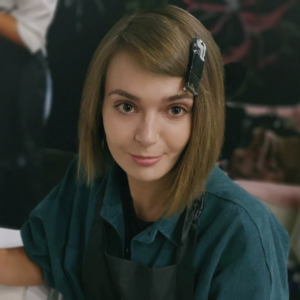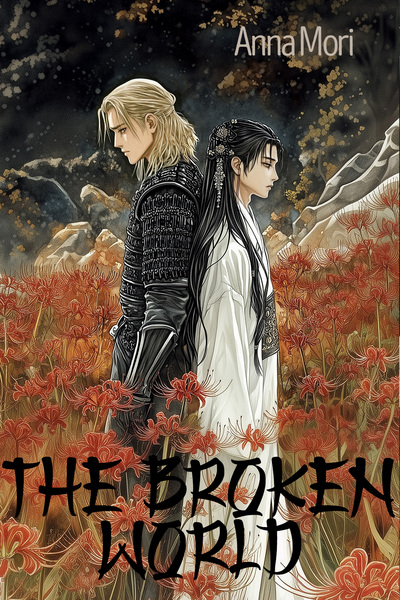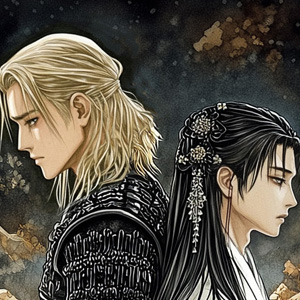The mask turned out to be an excellent way to slip out of the palace and explore the city. Gerel knew his appearance would inevitably draw attention. Even dressed in the inconspicuous garb of a commoner, his foreign features would stand out among the black-haired, almond-eyed citizens of Shinju like daylight against the night.
He recalled a celebration of the Day of Equals he had once attended in Yuigui.
Legend claimed the festival was the creation of Di Huan, a mythical ruler whom the Yuigui people believed to be the earthly incarnation of the Tortoise. The idea was simple yet profound: to erase — if only for a single day — all boundaries of status, wealth, age, appearance, and even gender. Under the cover of masks and costumes, people mingled freely, speaking and dancing with strangers, untethered from the weight of their identities.
Masks in Yugui, by the way, were widely used beyond the festival. Faces were often hidden by both women and young men of easy virtue, as well as those seeking their services. Di Huan likely would have disapproved of such uses for her invention, but anyway, the Day of Equals remained beloved, fulfilling its intended purpose year after year. Yuigui citizens often cited it as proof of their nation's progressive spirit and broad-mindedness.
Many years ago, when Gerel was a seventeen-year-old boy, the Day of Equals in the Yuigui capital had coincided with one of those moments when he felt suffocated by unwanted attention. At the time, he was not yet the famed general, the scourge of nomads, the monster of myth. And yet people always turned to stare — some with awe, others with unease. He was used to it by then. He had grown accustomed to his towering frame and striking appearance, to being rigid and impenetrable, like an iron rod. He was always ready to be struck — and to strike back.
But in Yuigui, everything was too safe, too comfortable. He had grown soft. The interest people took in his appearance lacked the malice or disdain he was accustomed to, but there came a moment when he could bear it no longer. He longed — not to be ordinary; that was impossible — but to experience what it might be like to be invisible. Just another face in the crowd, a man without a name, free from the constant pressure of curious or wary eyes.
The feeling of being unseen was oddly liberating.
He had not worn a mask in years and had almost forgotten the sensation. But it was wonderful. Both then and now. People's gazes slid over him without pause. A cat mask? Likely an actor or another reveler — nothing unusual.
Gerel wandered the city for hours, marveling at Shinju's stark yet graceful architecture, its delicate bridges arching over narrow canals. He spent much of his time near the docks and along the waterfront. The sight of departing sails, the smell of brine and fish, even the raucous cries of gulls fascinated him. Once, he caught sight of a heron standing beneath the shadow of a pier.
He didn't forget his purpose, though. As he walked, he mentally mapped the city, marking strategic points in his mind.
It soon became clear the city was in worse condition than he had first thought. Stray too far from the central canals and streets, and the number of crumbling, collapsing buildings increased exponentially. The narrow alleys reminded him of prison corridors, damp and oppressive, leading abruptly to the dark waters of the canals, as if inviting someone to leap in and drown. Supposedly, those spots were meant for boarding boats — Shinju's primary mode of transport — but the overall impression was stifling.
Still, during the festival, the people of Shinju were cheerful, dressed in bright clothes adorned with flowers. Many wore masks or costumes. Nobles and officials were ferried through the canals in lavishly decorated boats or traveled in ridiculous carriages with oversized wheels, palanquins, or sedan chairs. Yet the farther Gerel ventured from the imperial palace, the fewer such sights he encountered. The contrast between the lives of the aristocracy and ordinary citizens was striking, and the nobles seemed determined to avoid the poorer districts altogether.
After the dispiriting impression left by the palace's inhabitants, Gerel found himself drawn to the simplicity of the common folk. They were not so different from the people of Yuigui or Cheongju, and their unpretentiousness stirred a reluctant fondness in him.
Walking through the marketplace, Gerel suddenly heard a familiar voice coming from a nearby stall. At first, he thought he must be mistaken — what would the emperor be doing so far from the palace, in the lower city?
The voice called out:
"Come closer! The finest hairpins and combs!"
He turned toward the sound, and to his astonishment, there he was — Yukinari, the Emperor of Ryokoku.
The young man stood behind the stall, unpainted, dressed in simple but clean clothes befitting a common merchant. His elaborate imperial hairstyle had been replaced with a single braid draped over his chest. But it was unmistakably him. How could Gerel fail to recognize that face?
The absurd thought of a double flashed through his mind but was dismissed just as quickly. There couldn't possibly be two people with that face, with that peculiar restless smile.
It was good — so unexpectedly, overwhelmingly good — to see him without the veil again. Just the sight of his face and the sound of his voice brought an inexplicable joy, as though Gerel were on the verge of remembering something vital and beautiful, something long forgotten...
Gerel approached the stall, curious and intent on understanding the scene before him. At that moment, Yukinari was enthusiastically showing a hairpin to a wealthy, middle-aged woman.
"How much?" she asked, clearly considering the purchase.
"Twenty dragons," Yukinari replied with an apologetic smile. "It's the work of a master craftsman, so the price is a little high. But I know you can afford it."
Gerel listened, intrigued. Twenty dragons was a sum that could sustain a poor family for a month or more. The woman hesitated, doubt flickering across her face. Clearly, even for her, this was no trivial expense. The true value of the pin was perhaps a fraction of what Yukinari was asking.
She set the hairpin back on the counter but lingered, reluctant to leave.
"Would you like to try it on?" Yukinari asked, leaning forward to affix the pin to her hair with careful fingers. He handed her a mirror. "Ah, I must offer you a discount! Seventeen dragons, and it's yours. It suits you so well. Just look..."
The woman beamed, flattered.
"Really? With such a handsome young man selling them, I could buy hairpins every day..."
Gerel noted how much bolder and more outspoken the city women were compared to the silent, decorous courtiers.
It occurred to him that this class of merchants and artisans — wealthy yet stripped of rights and privileges that the aristocracy had — but most likely free of their prejudices too — might hold the key to changing Ryokoku's rigid system. Dissatisfied but educated and resourceful, they could be powerful allies for a ruler seeking reform. Yet for now, they seemed few in number.
Yukinari glanced up and saw Gerel watching from the crowd. Though the cat mask concealed his face, the emperor recognized him instantly, perhaps by his height or the fair hair the townsfolk mistook for part of his costume.
Yukinari's eyes widened in surprise before his lips curved into a conspiratorial smile. He glanced briefly at the woman before him, silently signaling, Wait a moment. Let me finish here, and then we'll talk.
He carefully wrapped the hairpin, tucked the money beneath the counter, and bid the woman farewell with the most sincere and captivating smile:
"I'll be delighted to see you again!"
Only after the customer disappeared into the crowd did he turn to Gerel.
"Good day. It is you, isn't it? I'm not used to seeing you out of uniform."
"Are you out of your mind?" Gerel said, his voice low and sharp. "If anyone recognizes you, it'll be a scandal. It's bad enough that I'm here alone and none of my men saw this spectacle. Otherwise, the entire Middle Kingdoms would already be gossiping about how you're making a fool of yourself."
"They say plenty about me already," Yukinari replied, and Gerel thought he caught a faint note of bitterness. It pricked at his own conscience, drawing to mind that foolish campfire conversation among the soldiers: "They're all 'cut sleeves' over there..." Not for the content, of course, but because it was then the idea of marrying Yukinari to a Cheonju princess had first crossed his mind. At the time, it had seemed like a reasonable alternative to war. He had seen no other ways. But surely they existed. They existed, but...
But traveling to Ryukoku with the embassy, he'd severed those paths with his own hands.
Yukinari, perhaps assuming Gerel was dwelling on those very rumors, met his gaze with calm, unruffled composure. Those dark eyes of his — like pebbles resting in the bed of a clear stream — showed no hint of concern.
"I don't mind what people say," Yukinari remarked evenly. "If my actions can help my country, then let them talk. And your men didn't see my face during our first meeting. Neither did anyone else who shouldn't. They've only ever seen me veiled." He gestured around them. "And if you wanted to tell anyone what you saw today, no one would believe you anyway. You're a foreigner here, after all."
"That's not what I was thinking."
What I was thinking, Gerel amended silently, is that it's good most buildings in Shinju are made of stone. Anything wooden will burn in the fires, and they'll drag sacks of corpses down these streets...











Comments (0)
See all